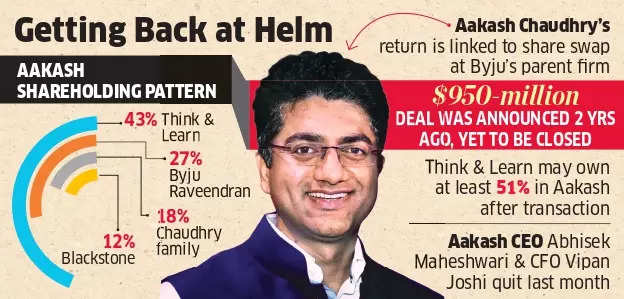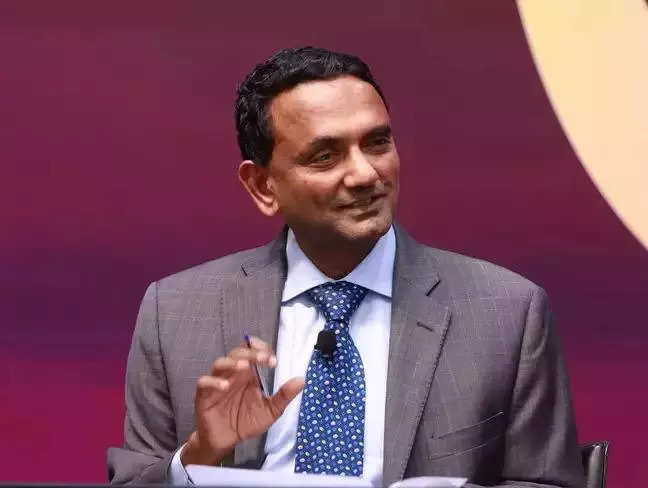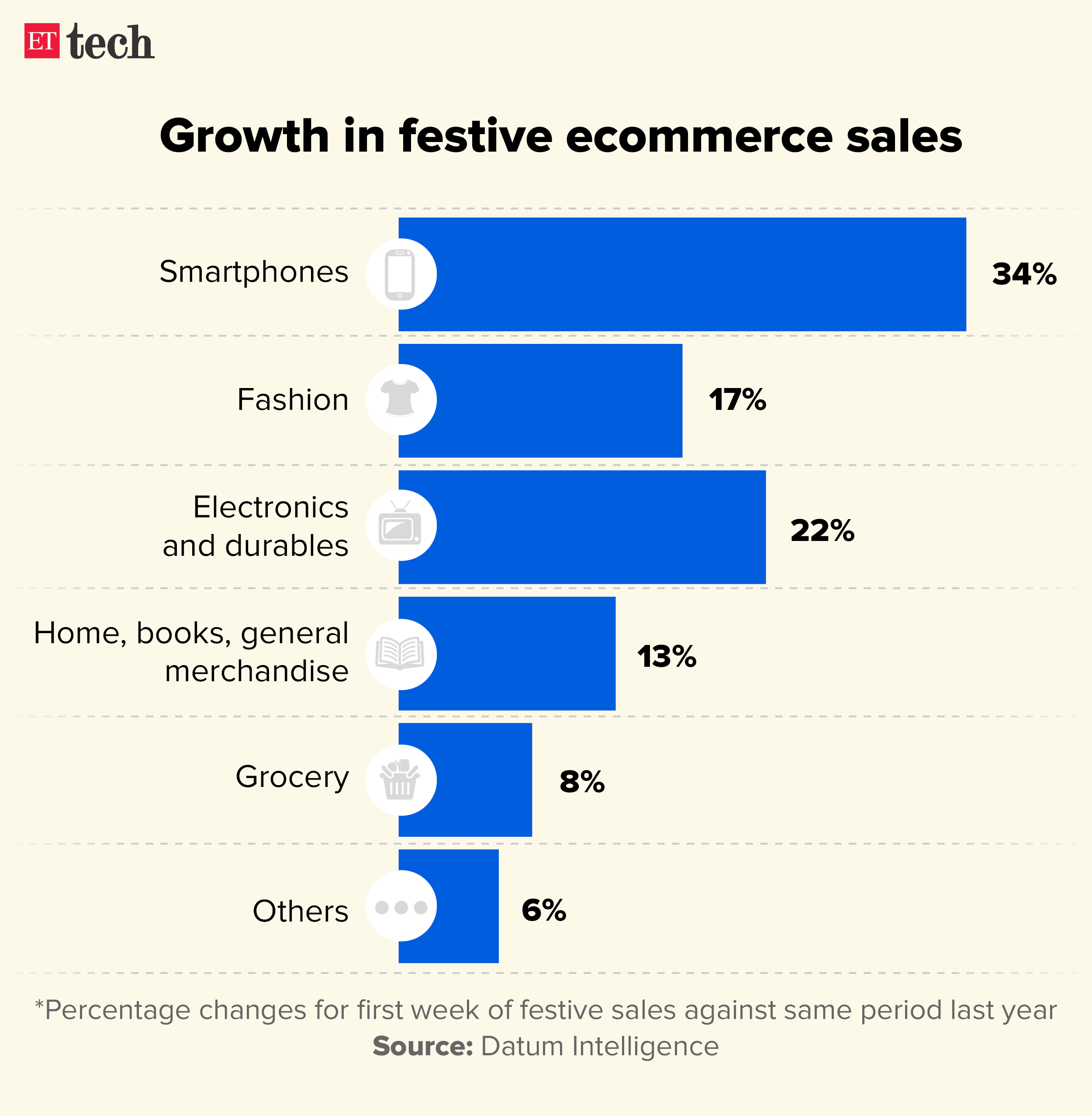Also in this letter:
■ Ecommerce festive sales off to a great start on deep discounts
■ Swiggy hikes platform fee on food orders to Rs 3
■ Age-gating rules apply to all firms under data law
Chaudhry may return as Aakash CEO, nears stock swap deal with Byju’s
Byju’s-owned Aakash Institute, one of the key assets of the troubled edtech firm, is ready to see an important comeback at the top which is linked to the $950 million deal announced two years ago. Let’s dive right in:
First, the news: Aakash Chaudhry, promoter of the brick-and-mortar coaching network firm, is likely to come back as the chief executive of Aakash, sources said. He was the CEO till November 2020, and later resigned from the board last December.
There’s more: The comeback is part of the bigger arrangement being finalised between Byju’s and Aakash. And now, the Aakash promoter group is close to executing its share-swap in Byju’s which will give him around 8% in Think and Learn – the parent of Byju’s. Chaudhry is likely to retain around 9% in Aakash.

Long and winding road: The mega edtech deal was announced two years ago. However, the share-swap part of the deal is yet to close. In between, due to a delay in disclosing Byju’s audited FY22 results, trouble with $1.2 billion term loan B creditors, both Byju’s and Aakash have been negotiating to close the deal. It seems it may finally happen this month.
Key shareholders: Think and Learn has around 40% in the firm while Byju Raveendran – CEO of the edtech firm – also holds close to 30% in the offline coaching unit. Investment fund Blackstone has another 12%. All this may change as ET reported on October 12 that Manipal group chairman Ranjan Pai is looking to cut a much bigger cheque of $250-300 million in Aakash. Given all this goes as per plan, Raveendran is expected to retain around 12% eventually in Aakash.
Pending matters: All said, Byju’s still needs to close some critical matters urgently.
Read ETtech’s detailed coverage on Byju’s
TCS seen posting single-digit growth in FY24: CEO Krithivasan

Indian IT services major Tata Consultancy Services (TCS) is likely to grow in “very moderate single digits” in FY24, CEO K Krithivasan told ET in an interaction. If so, the country’s largest software exporter would register its slowest ever annual growth in one of the most testing years for the IT services industry.
Some key takeaways:
On growth prospects: “The last two quarters have been very muted. The second half is seasonally weak. I won’t be able to call out whether H2 will be weaker than H1. We are not looking at a very strong growth given the first two quarters have been very moderate. It will be a single-digit growth obviously, but we have to wait and watch.”
Also read | HCLTech expects Q3, Q4 growth to lead industry numbers: CEO C Vijayakumar
On recruitment irregularities: “The investigation concluded with a list of 19 employees against whom action has been taken for a violation of the code of conduct. Different actions are being taken on all depending on the kind of violation. We had earlier announced that action had been initiated against six firms and that is the final number.”
Also read | TCS Q2 net profit up 9%, announces Rs 17,000 crore share buyback
On deal delay & revenue impact: “I won’t be able to tell you the impact on revenue because this (delay/reprioritisation) is more of a function of individual clients and their outlook for the future. If they are very confident of the future then the threshold with which they will evaluate ongoing projects will be different from someone who’s saying that they will be in a cost control mode.”
Also read | TCS reports dip of 6,333 employees during Sept quarter, attrition eases
Ecommerce festive sales off to a bright start on deep discounts

Ecommerce shopping during the first week of flagship sales got off to a good start, with brands and ecommerce platform executives saying the response in the first week has been better than expected.
Numbers say a lot: Between October 7 and 14, Indian ecommerce platforms clocked gross sales of over $4 billion, an increase of about 18% from the first week of festive sales a year ago, said Satish Meena, an advisor at market research company Datum Intelligence. In order volume terms, online retail saw a growth of over 30% between October 7 and 13, said ecommerce enabler firm Unicommerce.

Driving premiumisation: Customer choices across segments like smartphones, laptops and home appliances indicated premiumisation across the country, said Walmart-owned Flipkart.
“Banks and other financiers look at this period as crucial for customer acquisition, retention and engagement, very much like the way we do. Their affordability schemes have helped drive a lot of the premiumisation trends that we have seen, especially in large categories like smartphones,” said Noor Patel, a vice president at Amazon India.
Discounts sweep away Shradh concerns: Deep discounts seemingly shook off customer concerns about the impact of the Shradh period, which lasted till October 15. Shradh is considered inauspicious by Hindus for making purchases. In categories such as beauty and personal care, discounts went up from between 10% to 25% on business as usual (BAU) days to between 20% to 40% on average.
Also read | Ecommerce discounts shrink on day three on 30% surge in festive sales
Swiggy hikes platform fee on food orders to Rs 3

In a move towards improving its unit economics further, Bengaluru-based Swiggy has increased the platform fee — a flat charge it levies on food delivery orders – by 50%. The decision follows its rival Zomato’s call to also increase the fee by a similar quantum.
Pay more: Swiggy has increased the fee to Rs 3 from Rs 2 earlier. The way Swiggy charges the fee is that it shows the levy to be Rs 5 with a discount of Rs 2. Essentially, this indicates a further headroom for the company to hike the fee.

The details: Swiggy had initially started levying the platform fee back in April, and it is charged in addition to the delivery fee, which is waived off for customers of the company’s loyalty programme Swiggy One who make an upfront payment and get benefits like free delivery of food and groceries. However, the platform fee is also applicable for Swiggy One subscribers.
Demand impact: A recent report by brokerage firm UBS stated that consumers were broadly agnostic to marginal increases in costs, and that such non-delivery fees provided revenue upside and helped unit economics.
Also read | Consumer internet companies levy per-order charges to up margins
Age-gating rules apply to all firms under data law

The new data law’s mandate of verifying the age of minors through parental consent has sent not just social media companies but scores of others from telcos, banks to ecommerce companies and their lawyers in a tizzy.
Age-gating for all: Experts told ET that not just social media platforms, but all companies will need to have age verification mechanisms, otherwise, there is no way to record the verifiable consent of users. But what has the firms worried is that this will be costly and time-consuming.

Also read | Government gives big tech an opportunity to show age-gating plans for DPDP implementation
Expert take: Technology and telecommunication lawyers who are being approached for guidance on the implementation of the Digital Personal Data Protection Act, 2023, have told companies to read the finer details.
“While verifiable consent is not defined, the fact that you need to know who you’re dealing with means that you need to have some sort of age verification measures in place in any event to be able to first understand that I’m dealing with a minor and now I need verifiable consent,” Shreya Suri, partner at Indus Law firm, explained.
Other Top Stories By Our Reporters

The data dilemma: Companies find India’s privacy law a tricky maze to traverse | India’s first privacy legislation, the Digital Personal Data Protection (DPDP) Act 2023, was supposed to have a transformative effect on the country’s tech landscape. But two months after India enacted the law, companies are still finding it a tricky maze to traverse, with more unanswered questions than solutions provided.
How UPI tips the scale against hotel staff: India’s digital payments revolution may have inspired the rest of the world, but it has taken a toll on tipping jars in the country’s top hotels. With guests increasingly preferring not to carry physical cash, staff at these hotels have seen their tip incomes dwindle.
IT hardware firms with build plans may get extra year of curb-free imports: The government is likely to extend by another year the restriction-free imports of IT hardware products such as laptops, tablets and servers to companies that submit a manufacturing schedule by September/October next year, a move to incentivise firms to set up local production units.
Global Picks We Are Reading
■ How Silicon Valley missed the next wave of ecommerce (Rest of World)
■ How Brad Smith used Microsoft’s $1 billion law and lobbying machine to win Activision battle (Financial Times)
■ A new tool helps artists thwart AI—with a middle finger (Wired)
























